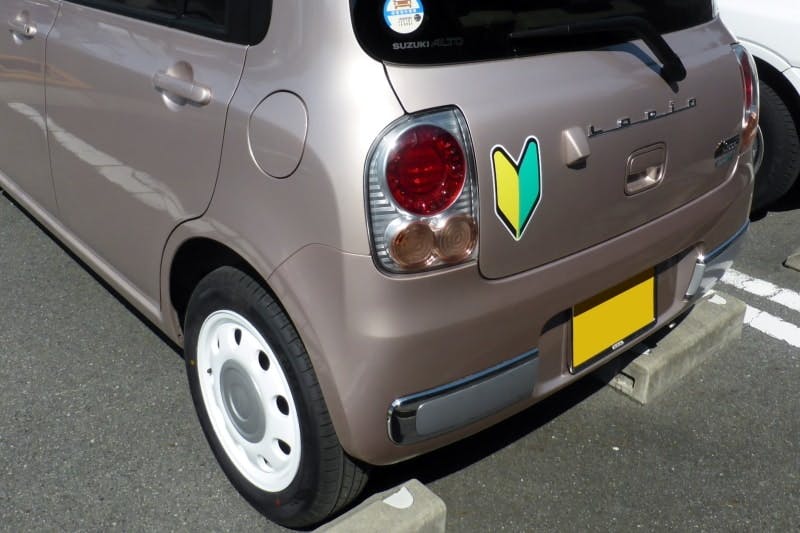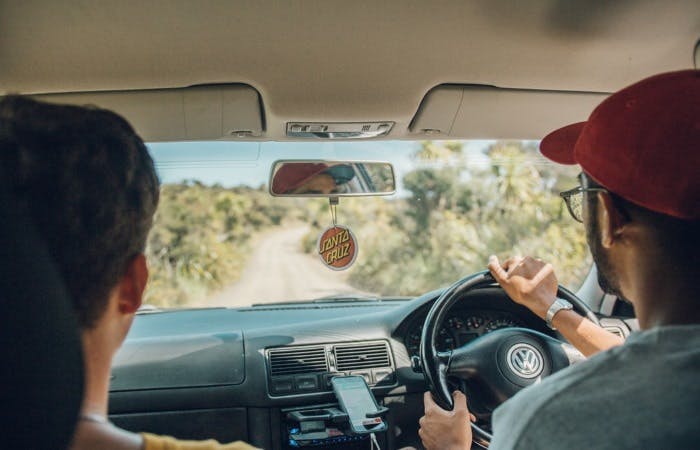
As the saying goes, you only really start learning to drive after you pass your test. After all, this is when you'll first experience the roads without your instructor as a safety net. Understandably, this can be difficult for some learners to adapt to. It may surprise you to learn, then, that there are no real restrictions placed on drivers who've only just earned their wings (or, well, pink licences).
However, the days of untrammelled freedom for newbies may be numbered. That's because the Department for Transport is considering introducing a graduated licence scheme. This would add an extra stage in between passing the practical test and becoming a fully licensed driver. But how would it work—and is it a good idea? PassMeFast is here to bring you the facts, pros and cons, so you can get informed.
What is a graduated licence scheme?
Graduated licence schemes aim to boost road safety by making the process of obtaining a full driving licence more rigorous. Though the exact details of such schemes vary by jurisdiction, one common feature is the introduction of a probationary period which begins after a driver first passes their test.
During this period, additional restrictions apply to the driver. These may include limiting the number of passengers they can carry, restricting the hours when they are able to drive, preventing them from driving on motorways, or only allowing them to buy cars with a smaller engine.
Other aspects of the system may include requiring drivers to take an additional test at the end of their probationary period. They may also be required to complete a certain number of lessons with an instructor, or hold a licence for a specific length of time before they are able to take a driving test.
What is the situation in the UK at the moment?

The process of obtaining a licence in the UK does not currently incorporate a graduated licence scheme. To get a licence, a learner must first fill out an online application form, then pass both the theory and practical test. There is no set number of lessons a learner has to complete—though, with the UK's tests ranked amongst the toughest in the world, getting some professional training is a must.
Once a learner passes their test, they're considered equal to any other motorist on the road, and are able to drive without restrictions… for the most part. There are a couple of extra rules that new drivers need to take heed of:
- In the first two years after passing your test, you must not obtain six or more penalty points on your driving licence. Doing so will result in your licence being revoked. If this happens, you'll need to retake your tests in order to start driving again.
- In Northern Ireland, those who have held a full licence for less than one year must display orange R plates (for 'restricted'). Both learners and restricted drivers must not exceed 45 mph.
New drivers here, therefore, enjoy more freedom on the road than their counterparts in countries like Australia and New Zealand. In recent years, though, the Department for Transport has begun examining a move towards graduated licensing. So, should the UK toughen up its system, or is the current approach the correct one? We'll examine the arguments for and against.
Graduated licence schemes: the arguments for
Reducing road traffic deaths
Road safety is at the heart of all graduated licence schemes, and central to that is the goal of reducing road traffic fatalities—particularly amongst young people. In the UK, road traffic accidents account for 46.1% of all deaths amongst the 15–19 age group, and 31.7% amongst 20–24-year-olds. Meanwhile, drivers under 25 account for around 20% of all drivers killed or seriously injured in road traffic accidents, despite making up just 7% of the total number of drivers.
Some groups, such as road safety charity Brake, believe that the implementation of a graduated licence scheme is a necessary step to bringing these figures down. The theory here is that it's unsafe for inexperienced drivers to tackle some of the riskier scenarios on the road, such as driving at night. Instead, they propose only allowing people to drive in these circumstances once they have considerable experience behind the wheel.
This was the primary motivation behind the introduction of a graduated licence scheme in New Zealand in the late 1980s. We've examined the results of this in our case study below.

In the mid-1980s, New Zealand witnessed an extremely high level of road traffic deaths amongst young people, with the fatality rate in 1985 for 15–24-year-olds standing at 48 per 100,000. This age group accounted for 39% of all traffic deaths, and 27% of injuries—despite comprising just 18% of the population and driving a mere 8% of all annual mileage.
In an attempt to tackle this, in 1987, New Zealand's Ministry of Transport introduced a graduated licensing system for those aged 15–24. Following a later review, it now applies to all new drivers, and is composed of the following stages:
- To obtain a learner's licence, you must pass a theory test, as well as an eyesight exam. Since 2011, the minimum age to obtain a licence has been 16.
- Those with a learner's licence are able to drive under the supervision of someone who has held a full licence for at least 2 years. After 6 months with a learner's licence, a driver becomes eligible to take a practical driving test.
- Once the driver passes the practical test, they move onto a restricted licence. This allows you to drive independently, but with the following rules: No driving between 10pm and 5am unless supervised, restrictions on which passengers you can carry without supervision and stricter blood alcohol limits
- A full licence can be obtained after holding a restricted licence for:18 months, if you are under 256 months, if you are 25 or over
- Drivers can reduce the restricted licence period by taking an advanced driving course. Those who successfully complete this course only need to hold a restricted licence for:12 months, if under 253 months, if 25 or over
The effects of these changes were striking and long-lasting. Between 1985 and 2015, the number of road fatalities was reduced by over 50%. This effect was particularly concentrated in younger age groups: amongst those aged 15–24, the rate of road traffic deaths fell from 48 per 100,000 to 10 per 100,000. However, there has been a slight uptick in fatalities since 2015, attributed to more motorcycles on the road and more time spent driving overall.
Covering more ground than the current test
At present, the UK driving test consists of a few key elements:
- An eyesight check
- Vehicle safety and maintenance questions (also known as “show me, tell me”)
- General driving, following guidance from an examiner
- Independent driving, following traffic signs or satellite navigation
- Reversing manoeuvres
Though the test itself is certainly no cakewalk, some argue that, by its very nature, it can't examine the full range of skills necessary for safe driving. Driving tests can't, for example, take place at night; nor can they encompass all weather conditions or road types.
Graduated licence schemes address this by requiring a much longer learning period before a driver can take their test. By doing so, the aim is to ensure learners gain a much greater breadth of experience before they're able to drive solo.
Preventing risks to passengers

Drivers of any experience level can agree that getting behind the wheel can become much more stressful if there's someone in the passenger seat. Driving with passengers comes with an array of risks, from distractions and peer pressure to a compulsion to show off your newfound skills. No matter what the cause, the evidence shows that young drivers crash more regularly when carrying young passengers.
There's another obvious danger to driving with passengers: with more people in the car, the risk of multiple injuries and even deaths resulting from a crash increases. To combat this, proponents of graduated licence schemes propose banning new drivers from carrying passengers—or at least restricting this to a driver's partner and a few close family members.
Entrenching safe driving habits
Most drivers will admit to having a bad habit or two, from keeping your hand on the gearstick to riding the clutch. These tend to develop over time, only rearing their heads once a driver is away from an instructor's watchful eye. Meanwhile, we tend to let some important aspects of driving slip, such as keeping to the speed limit.
Though graduated licence schemes don't claim to eliminate these issues entirely, by spending a longer time learning with an instructor, the chances are greater that good habits will stick. As such, the benefits of such a scheme go beyond the initial restricted period, and help create safe drivers for life.
Graduated licence schemes: the arguments against
Fairness

Though many people recognise that graduated licence schemes have laudable aims, one key criticism levelled against them is their broad-brush approach. Some argue that targeting all new drivers, rather than just those who actually drive recklessly or dangerously, results in people being unfairly penalised simply for being young.
Those opposing graduated licence schemes point out that, while a significant minority of young people are involved in road traffic collisions, the vast majority are not. Nicholas Rowley of a2om noted that most young people “want to be responsible and demonstrate this behind the wheel of a car”.
The argument here is that graduated licence schemes have the wrong focus. Instead of simply placing restrictions on novice drivers, more work should be done in educating them pre- and post-test—for example, ensuring that instructors build night-time and motorway driving into lesson time.
Allowing young people to gain experience
One of the key benefits of a graduated licence scheme, according to its supporters, is that it gives young people the chance to get experience with driving before they're exposed to any of the riskier aspects of it. The issue here, though, is that at some point, they will end up having to tackle these head-on.
Those who oppose graduated licensing feel that it's better to allow young people to get experience in situations such as driving at night. By doing so, they'll build up skills that will be necessary to drive safely. Putting this experience off until later may simply mean pushing problems further down the line.
Helping young people get to work or education

When discussing the merits of a graduated licence scheme, there's often a tendency to imagine young drivers racing down the road, hopping from party to party. The reality is that most young people who get a car will primarily use it for practical purposes, such as commuting to work, school or university.
The problem here is that most graduated licence schemes specifically restrict night-time driving—when it's often young people working late shifts in bars and restaurants. At these times, public transport simply isn't a reliable alternative for most, while taxis and private hire can be unaffordable. For these young people, a car is a lifeline, and offers them the chance to work.
Needs of drivers in rural areas
For a young person living in a town or city, the restrictions imposed by graduated licence schemes can cause some difficulty—but for those living in rural areas, they can be completely disabling. Here, there's often very little (if any) public transport, and a reliance on cars to get from A to B.
As with those living in urban areas, young drivers here may often find themselves needing to commute at odd hours, with early starts and late finishes extremely common in farming. Jeremy Todd, chief executive of the charity Family Lives, also noted that rural communities would be “disproportionately affected” by restrictions on the number of passengers a young driver could carry. It's even feared that, by making it harder for young people to access employment, the scheme could speed up the flight of youth from rural areas to towns and cities.
Environmental concerns

In an age where humanity is facing up to the monumental challenge posed by climate change, every action we take to preserve the environment matters. Carpooling forms one small part of this: by sharing a car, we take another off the road, helping to reduce emissions and shrink our carbon footprint.
With this in mind, restricting young people to driving without passengers seems to fly in the face of environmental protection efforts. After all, people will still need to get around—and if they can't share with a friend, they'll simply be on the road themselves.
Complexity
Given the criticism above, some groups have proposed making exceptions to the rules imposed by graduated licensing. This may include allowing a young driver to carry family members, or to drive at night, provided it's for work or education purposes. But therein lies the problem: how do you enforce this?
Even groups supportive of some elements of graduated licence schemes believe other aspects to be unrealistic. The charity IAM RoadSmart, for example, branded proposed passenger restrictions “unfeasible and unworkable in the real world”, while in an RAC report, Liberal Democrat politician Lynne Featherstone felt that it would be difficult to implement the many diverse measures encompassed in graduated licence schemes.
The verdict

Here at PassMeFast, we strongly support the goal of helping to improve road safety, reduce traffic collisions and prevent avoidable deaths. Nonetheless, we remain to be convinced that graduated licence schemes are the way forward.
Though our courses offer learners the ability to pass their test in a shorter period of time, they are fully comprehensive. When a young driver takes their course with us, they'll experience a full range of driving scenarios. By the time they start driving solo, they won't merely have learned enough to pass, but will instead have a solid grounding in a vast range of skills, laying the foundations for a lifetime of safe driving.
Nonetheless, we do see merit in offering young drivers the opportunity to expand the breadth of their training even further. It's for this reason that many of our instructors will offer their students the ability to take lessons on the motorway, or to drive at night where possible. For those seeking a more formal manner of building up this experience, the Pass Plus scheme is an incredibly valuable option.
The UK's driving test is ranked amongst the most challenging in the world. We believe that those who attain their licence deserve the right to enjoy the freedom of the road—a freedom they've earned.
Subscribe for driving advice, offers & more
We'd love to let you know about our courses, news and offers via email. You may unsubscribe at any time.
Star Genie Limited trading as PassMeFast. Company number 10093359
Copyright © 2024 owned by Star Genie Limited
PassMeFast, Blue Tower, MediaCityUK, Salford, M50 2ST
